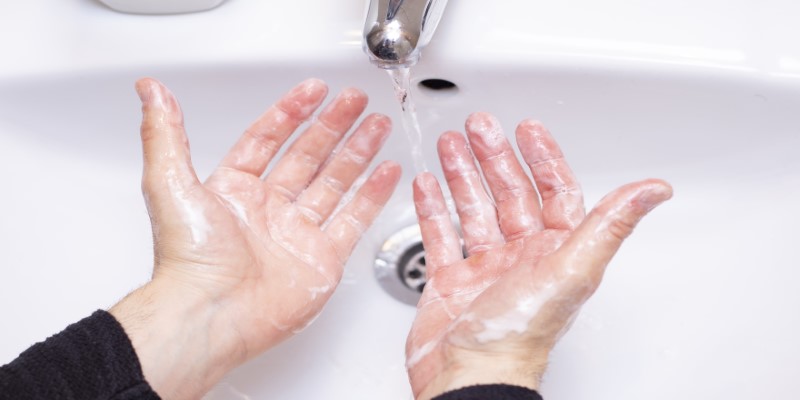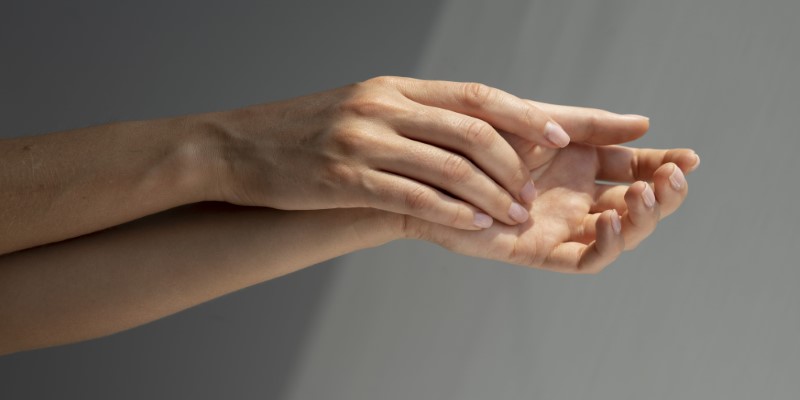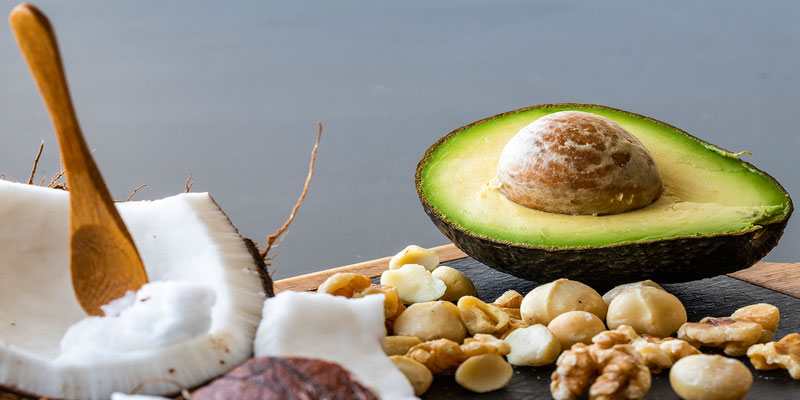Eczema, a prevalent skin condition marked by inflammation, persistent itchiness, and redness, presents unique challenges for individuals striving to uphold optimal hand hygiene. The struggle intensifies as frequent washing and sanitizing, although crucial for overall health, can inadvertently escalate eczema symptoms.
This article aims to provide relief by delving into three strategic approaches for washing and sanitizing hands without triggering additional discomfort. By adopting these methods, individuals can strike a harmonious balance between maintaining proper hand hygiene and mitigating the impact of eczema, fostering skin wellness and comfort in their daily routines.
What is Eczema?
Before embarking on effective hand hygiene strategies, it's essential to unravel the intricacies of eczema, scientifically termed atopic dermatitis. This chronic skin condition manifests as dry, itchy skin and persistent rashes. Its severity ranges from mild discomfort to more severe manifestations, affecting individuals across all age groups.
Recognizable symptoms include noticeable redness, inflammation, and the emergence of small, fluid-filled blisters. Understanding the multifaceted nature of eczema lays the foundation for tailored hand care practices to alleviate discomfort and promote overall skin health.
Ways to Wash and Sanitize Hands When You Have Eczema
Navigating the delicate balance between maintaining pristine hand hygiene and catering to the unique needs of eczema-prone skin requires a tailored approach. In the following sections, we will explore practical and considerate ways to wash and sanitize hands, ensuring optimal care for individuals managing eczema.
Choose Gentle Cleansers
Selecting the right-hand cleanser is crucial for individuals with eczema. Harsh soaps and detergents can strip the skin of natural oils, leading to dryness and irritation. Opt for fragrance-free and hypoallergenic hand soaps specifically designed for sensitive skin. Search for ingredients such as aloe vera or chamomile, as they are recognized for their calming properties. Avoid antibacterial soaps containing triclosan, as they may contribute to skin sensitivity.
Proper Hand Washing Technique
Proper hand washing is essential for everyone, but it becomes especially crucial for individuals with eczema. Follow these steps for an effective yet gentle hand wash:

Use Lukewarm Water: Hot water can strip the skin of its natural oils, contributing to dryness. Use lukewarm water instead.
Apply a Small Amount of Cleanser: A little goes a long way. Use a small amount of your chosen gentle cleanser to avoid over-drying the skin.
Gently Rub Hands Together: Instead of vigorous rubbing, opt for a gentle circular motion to cleanse your hands thoroughly.
Pat Dry: After rinsing, pat your hands dry with a soft towel. Avoid rubbing, as this can further irritate sensitive skin.
Moisturize Immediately
Moisturizing is a crucial step in the hand hygiene routine for individuals with eczema. After washing your hands, apply a fragrance-free and hypoallergenic moisturizer to lock in moisture. Look for products containing ingredients like shea butter or glycerin, which help hydrate and soothe the skin. Keep a travel-sized moisturizer to reapply throughout the day, especially after washing your hands.
Wear Protective Gloves
For individuals struggling with eczema, the routine acts of hand washing and sanitizing can pose significant challenges. If these activities exacerbate your skin condition, incorporating protective gloves into your daily routine can be a game-changer. This precautionary measure is particularly beneficial during activities that expose your hands to irritants or chemicals, such as household chores, gardening, or handling specific materials.
Protective gloves are a barrier, creating a physical shield between your sensitive skin and potential triggers. When selecting gloves, prioritize those made from hypoallergenic materials like cotton or nitrile. These materials are less likely to cause irritation and provide a comfortable protective layer for your hands. You can help prevent eczema flare-ups associated with external factors by minimizing direct contact with potential irritants.
Air-Dry Your Hands
While drying your hands with towels is common, the friction generated by rubbing against fabric can worsen eczema symptoms. Opting for air-drying whenever possible is a gentle alternative that can significantly benefit individuals with eczema.

After washing your hands, gently shake off excess water and allow your hands to dry naturally. This method eliminates the potential irritants in some fabrics and reduces the likelihood of further skin irritation. Additionally, air drying promotes better moisture retention, helping to maintain your skin's natural hydration. By adopting this simple yet effective practice, you contribute to the overall health of your skin and minimize the risk of aggravating eczema symptoms.
Choose Hand Products Wisely
Beyond hand soaps and sanitizers, the products you use daily can impact the health of your hands, especially if you have eczema. This includes hand creams, lotions, and even household cleaning products. To manage eczema symptoms effectively, choosing these products wisely is crucial.
Opt for fragrance-free and hypoallergenic hand creams and lotions to minimize the risk of skin irritation. Fragrances can contain allergens that may trigger eczema flare-ups. When choosing household cleaning products, opt for mild formulations that won't remove the natural oils from your skin. Check the ingredient list for potential allergens, and if uncertain, perform a patch test before incorporating a new product into your routine.
Embrace Healing Hand Soaks
Incorporating healing hand soaks into your hand care routine can provide additional support for individuals with eczema. Consider preparing a soothing hand soak using ingredients known for their calming properties. Fill a basin with lukewarm water and add a few tablespoons of colloidal oatmeal, renowned for its anti-inflammatory and moisturizing effects. Soak your hands for 10-15 minutes, allowing the oatmeal to alleviate itchiness and reduce redness.
Alternatively, infuse the water with a few chamomile or lavender essential oil drops. Both oils possess soothing qualities that can help calm irritated skin. Ensure the water is not too hot, as hot water can exacerbate eczema symptoms. Pat your hands dry with a soft towel and follow up with a gentle, fragrance-free moisturizer to lock in the benefits of the hand soak.
Conclusion
These strategies offer a delicate equilibrium in navigating the intricate landscape of eczema and hand hygiene. Balancing cleanliness with skin sensitivity is key. Individuals can foster hand hygiene without exacerbating eczema symptoms by choosing gentle cleansers, embracing proper handwashing techniques, and thoughtfully selecting products. Including protective gloves, air-drying, and judicious hand sanitizer further enhance this delicate dance. Coupled with healing hand soaks, these practices collectively empower individuals to manage eczema effectively, promoting hand cleanliness and overall skin well-being.







